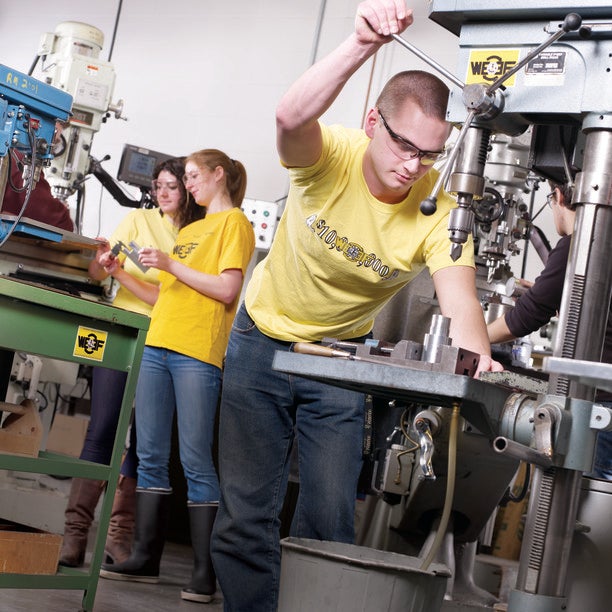
Student-led fund invests in the student experience
Donation from The Waterloo Engineering Endowment Fund (WEEF) to improve student spaces

Donation from The Waterloo Engineering Endowment Fund (WEEF) to improve student spaces
By Jack Weatherston Faculty of EngineeringThe Waterloo Engineering Endowment Foundation (WEEF) is making a historical donation of $750,000 to help improve student spaces across the Faculty of Engineering. This contribution is the latest in a long line of investments made by the student-led fund since its founding in 1989. As the fund has grown so has its ability to support a diverse range of causes from student projects to infrastructure improvements, all with the goal of providing world-class resources and experiences to current and future students. This legacy of institution building, driven by students for students, is reflected in the latest donation and the plans being drawn up for its use.
A Canadian first
WEEF was the vision of two engineering students, Avi Belinsky (BASc ’90, electrical engineering) and John Vellinga (BASc ’91, systems design engineering). Both were impressed by the facilities available at US institutions like Princeton and MIT, financed by large endowments. At the time Waterloo lacked the budget for cutting-edge equipment and facilities. To meet this need Belinsky and Velinga proposed the first student-funded and run endowment fund in Canada. Their classmates would be given the opportunity to pay into the fund monthly, as the principle grew so would the amount of accrued interest that could be used to fund equipment purchases.
The fund was an immediate success, drawing strong support from the student body. Three decades after it was founded WEEF reached $20 million, all sustained by $75 contributions once per term.
100 per cent student run
The WEEF model relies on the leadership of a Board of Directors comprised of a minimum of two-thirds students. All funding decisions are made by the Funding Council which is made up of representatives from each Faculty of Engineering and School of Architecture class. Current WEEF Director and third year Management Engineering student Zach Zammit identifies this system of checks and balances as one of the strengths of the organization. “If something being proposed isn’t really what students need, it oftentimes gets caught at the Funding Council level”, says Zammit. “WEEF representatives get invested in what they're doing, and they vote for what's best for the students, which I find really great.” Council members from each class can give their unique perspective on the suitability of funding projects, drawn from a real understanding of the needs of their fellow students.

Waterloo Engineering students work with equipment funded by WEEF.
Zammit emphasises the direct benefits of WEEF, and the ability of the fund to provide much needed equipment. “If I’m speaking to an ECE student I will tell them about the over $40,000 we spent on oscilloscopes. For MME students, the drill presses and other equipment, a lot of that was funded by WEEF.”
The fund has also been instrumental in supporting student design teams, with over $1 million dollars going to groups of students pursuing a myriad of innovative projects over the past ten years. This consistent support for the student community works alongside larger donations — including million-dollar investments in the Sedra Design Centre and the WEEF Student Machine Shop — to dramatically improve the Faculty learning environment.
A new opportunity
Over thirty years of successful stewardship has now put WEEF in the position to donate $750,000 of accumulated surpluses to the Faculty. A memorandum of understanding was recently signed with the Dean’s Office and plans are now being drawn up for the disbursement of the award.
Faculty of Engineering Executive Officer Fred Zhu is providing guidance on how the donation can improve spaces across the Faculty of engineering. “We are taking a more holistic view about the whole space and how it impacts student experience” says Zhu. “Student space is such a critical component of student experience, and Waterloo Engineering students deserve the best that we can afford.”
A review of all spaces will be carried out to determine the best use of both WEEF and Faculty funds with the goal to improve the student experience. Investments will be made in collaborative areas, providing more opportunities for focused conversation and teamwork. Special consideration will be given to wellness, with more informal spaces dedicated to recreation and giving students a chance to take a break. Upgrades to student spaces will be made across the Faculty and the School of Architecture.
The WEEF donation will be part of a larger investment made by the Faculty, however, students will remain at the heart of decision-making. “We're taking a collaborative approach and putting students at the center of these projects”, says Zhu.
This process exemplifies the way in which WEEF empowers students, giving them a voice in investment decisions that impact every aspect of the student experience. The fund is a unique mechanism through which the Faculty of Engineering student community can act strategically and support multiple generations of learners. As WEEF Director Zach Zammit says, “It’s putting money where students want it.”
The Waterloo Engineering Endowment Foundation (WEEF) is dependent on donations to grow the principal fund and help support students’ needs. Please contact WEEF if you would like to donate.

Read more
Redefining capstone learning by bringing students, faculty and community partners together to tackle real-world challenges

Read more
Here are the people and events behind some of this year’s most compelling Waterloo stories

Read more
A winter holiday message from President Vivek Goel
The University of Waterloo acknowledges that much of our work takes place on the traditional territory of the Neutral, Anishinaabeg, and Haudenosaunee peoples. Our main campus is situated on the Haldimand Tract, the land granted to the Six Nations that includes six miles on each side of the Grand River. Our active work toward reconciliation takes place across our campuses through research, learning, teaching, and community building, and is co-ordinated within the Office of Indigenous Relations.